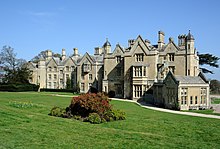For the locomotive of the same name, see GWR 4900 Class 4920 Dumbleton Hall.


Dumbleton Hall is in the village of Dumbleton between the towns of Evesham and Tewkesbury and on the boundary of Worcestershire and Gloucestershire. The Hall is a Grade II* listed building.
History

The original Dumbleton Hall can be traced from around 1690 as the home of the Cocks family for over 200 years. After the death of Sir Richard Cocks in the late 18th century the Hall fell into disrepair and was eventually demolished c1780. In 1830 the agriculturalist Edward Holland employed George Stanley Repton to build the present Hall using the local Cotswold stone. The Hall was completed in 1832.
Elizabeth Gaskell, the novelist and cousin of Edward Holland, was a frequent visitor to the Hall. Holland's eldest son married Mrs Gaskell's daughter. Holland knew Charles Darwin, Charles Dickens and the Wedgwood family and they are likely to have been visitors.
From 1881, Dumbleton Hall became home to the Eyres-Monsell family and in the 1920s and 1930s the Hall held house and society parties with regular guests including John Betjeman, later to become Poet Laureate, and the Mitford sisters. The German Ambassador Joachim von Ribbentrop was invited to stay at Dumbleton.
During the Second World War the Hall was allegedly considered as a suitable alternative venue for the House of Lords. In the 1940s the Women's Land Army were billeted on the top floor of the Hall.
The Hall became a private hotel in 1959 when it was purchased by the Post Office Fellowship of Remembrance for the benefit of its members for the sum of £180,000. In 1960 the Hall opened to provided holiday facilities to Post Office employees. It was funded as a living memory to those men and women of the Post Office who had died in the First and Second World Wars. A memorial garden was laid out in the former swimming pool area. Books of Remembrance listing all 12,830 postal workers killed in the two world wars were kept at the Hall, but these are now on permanent display at the Postal Museum in London.
In early 2021 The Post Office Fellowship of Remembrance sold Dumbleton Hall Hotel with the profits being donated to Post Office and BT related charities, to continue its mission to provide a living memorial for those workers who died the two World Wars.
Dumbleton Hall Hotel is now owned by the Dumbleton Hall Hotel Property Company Limited and represented by Bespoke Hotels, the UK’s largest independent hotel group.
Today
The Hall has been open to the general public as a hotel and wedding venue since 1996.
Namesake
The Great Western Railway named a GWR 4900 Class locomotive after the hall in 1929. Dumbleton Hall has been preserved and is currently in Japan.
References
- Hodges, John Richard (2015). Dumbleton Hall - The Story of a Victorian Country House. John Richard Hodges. ISBN 9780993163807.
- Historic England. "Dumbleton Hall, Dumbleton (1091709)". National Heritage List for England. Retrieved 14 October 2017.
- Pollard, Arthur "Mrs. Gaskell: Novelist and Biographer", 24. Online reference
- Evesham Observer, 11 September 2015. Online reference
- Dumbleton Hall fades into retirement The Railway Magazine issue 1185 January 2000 page 49
External links
52°01′08″N 1°58′56″W / 52.0190°N 1.9821°W / 52.0190; -1.9821
Categories: